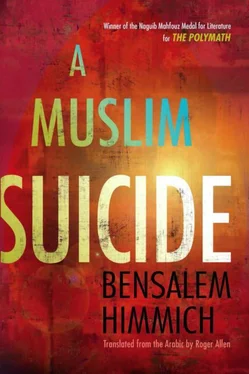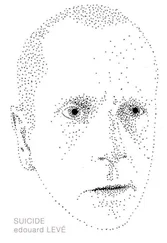"My friends," I said, "these nasty extremist jurists keep on making things difficult for me and convincing rulers to throw me out wherever I choose to reside and travel. Now the governor of Sabta is asking me to meet him and have a talk. I'm still doubtful about it."
"No, no, Sir," Al-Sadiq replied in a very serious tone. "Such diffidence on your part is entirely out of place. If the jurists of Sabta are conspiring against you, you definitely need to respond to the governor's invitation. If you find that he is an intelligent man, a faithful believer, and a judicious ruler, then so much the better for you. But if he seems to be the opposite, then you can use your own sagacity and experience to arrange matters as you see fit."
Both `Abd al and 'Adnan made it clear that they agreed with what he was saying, and I did likewise. I stood up to say farewell, and wished them a safe journey and a felicitous return to their families and loved ones. They in turn embraced me and promised to come back when circumstances permitted.
I felt sad that they too were leaving, not to mention Khalid and 'Abla; I was sad too because Hafsa was so sick; and sad because the jurists and their agents were conspiring against me. In alleviating so much sadness my only resort would be you, Fayha', you who have enabled me to show such "beautiful patience" (as Jacob declares in the Qur'an) and to seek sustenance for both soul and mind.
When I reached the door of the house, I was greeted by Bilal with a broad smile on his face of a kind I had never seen before. It was accompanied by gestures that intimated that Hafsa had gone out of control and been transferred to the asylum. As I hugged my wife, she confirmed what I had understood from Bilal and consoled me with the news that she had asked the officials there to take good care of her.
Inside the house rooms and courtyards were considerably less full of visitors, and the general atmosphere was much quieter and more relaxed. While we were eating dinner, Fayha' told me that she was delighted with the two new servants and had good things to say about their manners and general poise. I told her that that was thanks to God's good grace and the help of Rudwan. I alluded as subtlely as I could to Hafsa's odd behavior in the hope of getting her to talk about what she knew and was keeping to herself, but all I succeeded in getting were some censorious comments regarding the woman that comprised far less than what I knew and chose to keep to myself.
I fell into a deep sleep on our marriage bed just as soon as I lay down and wrapped myself in warm blankets. During my slumber I had a series of dreams of which I could only remember the smallest segments when I woke up.
NEXT DAY I STAYED IN MY CLOSET, concentrating on reading books and posing myself questions in the hope of doing some more editing of my book, Escape of the Gnostic. I also had to write some letters, the contents of which I had been carrying around in my head for a while. When it came to sleep, I was anxious to keep it to a bare minimum and make do with only what was strictly needed, all with the aim of avoiding the risk of terrifying visions and obsessions. I arranged my prayers by combining them all in the middle of the night, as part of which I performed a whole flood of devotions and channeled my mind and spirit toward loftier truths.
I spent the entire morning in this fashion. It was just after noon when my contemplations were disturbed by Fayha', who came to inform me that a horseman was at the door waiting to escort me to the governor's residence. I had completely forgotten about the appointment I had made with Ibn Khalas for this Friday. With some reluctance I now had no choice but to change my clothes and put myself to rights. I left the house, greeted the governor's messenger, and followed him on my horse. While we were on our way, I noticed that my escort was taking me into the center of the city by the eastern shore. He dismounted, and so did I.We were standing in front of an isolated house that looked out over the sea. The governor welcomed me profusely at the door and led me into his reception room, where he introduced me to his blind companion. He told me his name was Al-A`ma the Sicilian and described him as his most reliable source of counsel. I thought to myself that the designation was somewhat odd, but even so I sat down alongside the two men. Staring up at the ceiling, the blind man now started to say some complimentary things about me. A servant-girl of `Abla's age came forward and offered me some food and drink from the table; she then did the same for her master, who, like me, took only a little. He then signaled to her to leave. With that, the blind man stood up to say farewell and followed her out, putting one hand on her back while the other clung to his walking-stick. The governor wiped his mouth and beard and then looked affectionately in my direction.
"Pinnacle of the faith," he said, "this is the first time you've honored my council with your presence, even though you've been in Sabta for quite a few years. I'm not going to upbraid you for that-heaven forbid! After all, saints of God concentrate on worship and learning, and no one has the right to disturb them in that task. As you can see for yourself, I'm welcoming you in a modest house where I can find some peace and quiet. Were it not for the burdens of my office, I would stay here all the time by myself."
He had called me "Pinnacle of the Faith," a phrase only used by my own students and a few other acquaintances, and had portrayed me in a fashion that was partially correct, but not entirely. I decided to adjust the portrait somewhat.
"My lord," I responded, "meetings with people of goodwill are a boon without price! Only those with pure intentions and sound mind can truly appreciate their value. The problem is that the bulk of rulers in this broken and contentious age of ours-and I don't think you are among them-prefer to seek the counsel of crooked jurists and sycophants. They much prefer such people to those who are genuinely in quest of the truth and proclaim its virtues by stirring their consciences and stoking their aspirations. When it comes to matters of devotion and retreat, I choose to adopt the middle path of moderation, working on the basis of the words of the Lord of all Prophets: `Do not go to excess in your religion."'
"I'm well aware that you have students and groups of followers. Your reputation as a stolid defender of pure Islam preceded you to this city of ours, and in spite of all the current troubles and adverse winds that are now blowing."
"Our era is certainly not without its share of trials and difficulties. When people in authority have found themselves tested by such events, some of them have used the power of faith and action to overcome them and achieve victory: the first Muslims, for example, and in more recent times, the two amirs Zanki and Salah al-din* and the first wave of Almohads. Others, however, are the exact opposite: their powers have flagged (God preserve us!), so they have become feeble and submissive. They include the current Muslim rulers in Spain, including the Banu Hud who expelled me from Murcia before their own collapse and the Nasrids in Granada. All they are concerned about is holding on to their thrones for dear life, even if only for a short while. They are entirely unconcerned about the cities and property that have been lost. If anyone dares to remind them about the obligation to defend the cause of Islam, they either ignore him or else banish him from the Peninsula."
Ibn Khalas looked at me sympathetically. "Pinnacle of the Faith," he said, "the city of Sabta welcomed me, and I'm from Valencia. So I have in turn welcomed to my city, my court, and my coterie both religious scholars and writers, like Ibn `Umayra,* Ibn al-Ramimi,* and others. Today our city is honored and bedecked by your presence, and you are most welcome here."
Читать дальше












